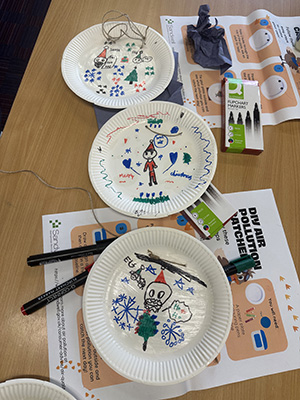Auntie Duck

Champion for Clean Air
Read the Auntie Duck Story
Arrange a Free Book Reading
Access Free Resources
Get in Touch
Welcome to our Auntie Duck Air Quality Page, keep reading to find out more about:
Auntie Duck, who is she?
Auntie Duck is the lovable main character in a children’s storybook about air pollution and how it affects our health and everyday lives. Through her adventures, children learn where the air they breathe comes from, what can make it dirty, and simple ways they can help keep the air clean for everyone.
The Auntie Duck storybook
To celebrate Clean Air Day in June 2024, Sandwell Council launched Auntie Duck, a free children’s storybook all about air quality. The book was created by The Dog, Duck and Cat Charitable Trust, with guidance from Sandwell’s Air Quality Officers.
Auntie Duck introduces children to the topic of air pollution in a gentle and age-appropriate way.
In the story, Auntie Duck arrives from overseas to visit her nephew, Duck, and shares what she has learned from encountering dirty air on her travels. As they spend time together, she explains where air pollution comes from, how it can affect our health, and the simple steps everyone can take to help keep the air clean.
Through friendly story telling, Auntie Duck helps children learn about air pollution in a gentle, relatable, and memorable way.
 |
Read the Auntie Duck Storybook
Why the book matters
The air we breathe affects our health every day, especially for children as they breath faster and their lungs are still growing, so they are more vulnerable to air pollution. But because we can’t always see air pollution, we don't often think about it or the harm it is doing to us.
Auntie Duck helps start important conversations with young children about clean air, caring for the environment, and looking after each other. It’s a great way for families, schools, and communities to begin talking about air quality and what small actions we can all take to help make the air safer for us all.
The storybook covers the following key areas:
- What air quality is
- What air pollution is and where it comes from
- Understanding how poor air quality can affect humans
- Understanding why keeping air pollution to a minimum is important
- Understanding what we can all do to improve air quality
- Knowing how you can see what the air quality is like where you live/ go to school etc
- Promoting that if children are worried or scared about something that they should tell an adult they can trust.
What we offer
For Schools
- Free printed copy of the book: Every primary school in Sandwell is being offered a free copy of the Auntie Duck storybook.
- Four lesson plans: The plans have been created with a PSHE educational consultant and aligned to the KS2 PSHE curriculum. Each plan includes clear learning outcomes, activities, timings, and required resources.
- Four Lesson guides: These are PowerPoint-based guides that can be used by teachers or parents. The guides include inbuilt links to the required worksheets, videos, and quizzes for easy and quick use.
- Teaching resources: A comprehensive set of hands-on educational materials to help pupils explore air pollution, its impact on health and communicating their concerns about air quality with others. The associated topic of road safety is also included. The package includes interactive quizzes, worksheets and videos.
- Auntie Duck Workshop: We offer a lively, interactive workshop including the reading of the story, a choice of engaging classroom activities, and a Q&A session to help consolidate learning. The session is delivered by an officer from Sandwell Council’s Air Quality team and lasts approximately 45–60 minutes.
- Auntie Duck Assembly: A school assembly led by an Air Quality officer, introducing the themes of the story and encouraging whole-school awareness of clean air.
- Auntie Duck mascot visit: You can invite Auntie Duck to visit your school after your workshop or assembly. With the option for children to have their photos taken with her.
We would love to share Auntie Duck with your school! Just follow the links below to get started:
Request your School’s Free Copy of the Storybook by emailing Auntie_Duck@sandwell.gov.uk
Book an Auntie Duck Workshop or Assembly by emailing Auntie_Duck@sandwell.gov.uk
Access Auntie Duck Teaching Resources for Your Class


For Libraries, Hospitals, Faith Centres, Bookshops, Community Groups
- Free storybook and resources: The digital version of the storybook and a wide range of resources are available and FREE for your centre to use.
- Book Reading and Workshop Visits: We offer interactive sessions with storytelling, activities and quizzes.
- Auntie Duck mascot visit: You can invite our Auntie Duck mascot to visit following a book reading or workshop, with the exciting opportunity to meet Auntie Duck and have their photo taken with her.
Would you like Auntie Duck to visit your setting? To request a free Book Reading, Workshop or Mascot visit for your group or centre just email Auntie_Duck@sandwell.gov.uk
If you wish to access all the Auntie Duck school teaching resources for use at your centre or group just click here, Where the login page asks for school details, please provide details of your centre / group / workplace instead and a contact email address.


Book readings and events
Where has Auntie Duck been already?
Auntie Duck has been visiting schools and community venues across Sandwell. Our book readings often result in lively discussions, and can be followed up with creative activities that leave children with a much better understanding of air quality and how they can help make a positive difference. Below is a list of just some of the places Auntie Duck has visited over the last year.
|
|
Event |
Venue |
Date |
|
1. |
Book Reading |
Sandwell General Hospital, Lyndon Ward |
06/08/2024 |
|
2. |
Ask About Asthma Week |
Oldbury Library |
09/09/2024 |
|
3. |
Ask About Asthma Week |
Sandwell General Hospital, Paediatric Unit |
13/09/2024 |
|
4. |
Safeguarding Day |
Tividale Primary School |
26/11/2024 |
|
5. |
Book Reading |
Glebefields Library |
29/11/2024 |
|
6. |
Book Reading |
Glebefields Library |
06/12/2024 |
|
7. |
Book Reading |
Thimblemill Library |
13/02/2025 |
|
8. |
Book Reading |
Cradley Heath Library |
24/02/2025 |
|
9. |
Auntie Duck Day |
Yew Tree Primary School |
03/03/2025 |
|
10. |
Assembly |
St Matthew's CE Primary School |
12/03/2025 |
|
11. |
Auntie Duck Day |
St Martin's CE Primary School |
26/03/2025 |
|
12. |
Assembly |
Hargate Primary School |
01/04/2025 |
|
13. |
Book Reading |
Old Hill Primary School |
04/04/2025 |
|
14. |
Easter Break Book Reading |
Bleakhouse Library |
14/04/2025 |
|
15. |
Easter Break Book Reading |
Rounds Green Library |
16/06/2025 |
|
16. |
Easter Break Book Reading |
Brandhall Library |
23/04/2025 |
|
17. |
Book Reading |
Ferndale Primary School |
29/04/2025 |
|
18. |
Auntie Duck Day |
Harvills Hawthorn Primary School |
08/05/2025 |
| 19. | Auntie Duck Day | Moorlands Primary School | 19/5/2025 |
| 20 | Book Reading | Midland Metropolitan University Hospital | 16/06/2025 |
| 21 | Book Reading by the Mayor of the West Midlands, Richard Parker in celebration of Clean Air Day 2025 | Corngreaves Academy | 19/06/2025 |
| 22 | Summer Break Workshop | Sandwell Valley Visitors Centre | 06/08/2025 |
| 23 | Summer Break Book Reading | Great Barr Library | 12/08/2025 |
| 24 |
Summer Break Book Reading (HAF – National Play Day) |
Hamstead Library | 15/08/2025 |
| 25 |
Summer Break Book Reading (HAF – National Play Day) |
Bromwich Hall | 20/08/2025 |
| 26 | Auntie Duck Workshop | The Priory Primary School | 22/10/2025 |
| 27 | Auntie Duck Mascot Visit | The Primrose Centre | 14/11/2025 |
| 28 | Auntie Duck Assembly | Reddal Hill Primary School | 01/12/2025 |
| 29 | Parent's Evening | Brandhall Primary School | 04/12/2025 |
| 30 | Santa Village | Sandwell Valley Visitors Centre | 08/12/2025 |
| 31 | Auntie Duck Assembly | Corngreaves Academy | 15/12/2025 |
| 32 | Toddler's Group | Salvation Army Cradley Heath | 20/01/2026 |
| 33 | Auntie Duck Assembly | Sacred Heart Primary School |
03/02/2026 |
| 34 | Auntie Duck Day | Grove Vale Primary School | 25/02/2026 |
Auntie Duck event feedback
“The children really enjoyed the assembly and were really engaged throughout. The story resonated with them, particularly the younger ones, and it sparked conversations about the car situation outside our school gates every morning and afternoon. It has also had a positive impact on our Living Streets Travel Tracker as we are seeing lots of children encouraging parents to walk or park further away to walk so they can earn their badges..” Year 5 Class Teacher
“The children enjoyed the book reading so much! And look forward to future workshops.” Headteacher
“I have really enjoyed reading this…Illustrations are amazing. I will be reading it to my grandchildren. My grandchildren will be calling me Nanny duck instead of Nanny Ro.” Grandparent
“I love that this book is not only fictional, but it's also factual!” Year 4 Student
“This book has greatly influenced me, thank you so much!” Year 3 Student
Get involved
Partnership opportunities
We're always looking to work with schools and organisations across the borough, we are a passionate team who want to help support children's education, health and wellbeing. Whether you're a local council, public health body, school network, community organisation, or creative partner, we'd love to hear from you.
Ways we can collaborate and partnership work include:
- Hosting joint events and workshops
- Sharing educational content and co-developing new resources
- Including Auntie Duck in your sustainability or environmental education initiatives
- Promoting clean air messages through joint campaigns or social media
- Supporting community outreach and engagement in under represented areas.
If you’re interested in partnering with us or have an idea for collaboration, please send us an email at Auntie_Duck@sandwell.gov.uk
Subscribe to Our Newsletter
Want to stay in the loop with the latest updates on Auntie Duck, air quality campaigns, educational resources, and upcoming events across Sandwell? Subscribe to our newsletter.
Frequently Asked Questions (FAQs)
Who wrote the book?
Auntie Duck was written by the Dog, Duck and Cat Trust in collaboration with Sandwell Council’s Air Quality Officers.
Is it really free?
Yes, Auntie Duck is free for every school and community centre in Sandwell at no cost.
Who is this book for?
The book can be read by children aged 5 – 11 but is specifically for children aged 7 – 9.
Can you visit a centre outside of Sandwell?
Workshops are prioritised for schools and centres in Sandwell, but feel free to enquire and we will see what we can do.
Can I request the book for personal use?
Yes, the digital version of the book and resources are available for everyone for free.

